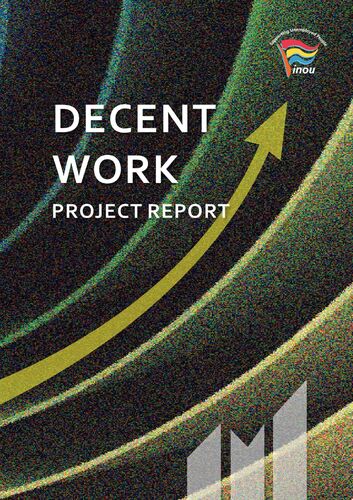In 2020 with the support of the Irish Human Rights and Equality Commission Grants Scheme, the INOU ran a project on the theme of decent work. Issue 41 contains an article on the project and what had happened by April 2020, since then a webinar has been organised, a report and a video produced. The speakers at the webinar included Tony Geoghegan IHREC Commissioner; Ger Gibbons, Policy Officer, ICTU; and Nichola Harkin, Employment Law Solicitor, IBEC.
As the report notes decent work regularly features at the INOU’s regional Discussion Forums, these forums involve participants from organisations working on the ground seeking to support people to gain access to a job that will ensure they can manage their own lives. A broad range of people access these supports including unemployed people, people who are parenting alone, people who have disabilities, Travellers and people from other minority ethnic groups, and others distanced from the labour market.
The International Labour Organisation (ILO) states that “Decent work involves opportunities for work that is productive and delivers a fair income, security in the workplace and social protection for families, better prospects for personal development and social integration, freedom for people to express their concerns, organize and participate in the decisions that affect their lives and equality of opportunity and treatment for all women and men”.
Amongst the key findings of the project was the “Need to ensure that there is greater awareness of the International Covenant on Economic, Social and Cultural Rights (ICESCR), the International Labour Organisation’s (ILO) definition of decent work, and the European Union’s Pillar of Social Rights (PSR).” Participants also noted that “People need to be made aware of their right to exercise their rights without penalisation and to participation in discussions around conditionality and rights.”
Other key findings included:
- The concept of empowerment is a very important one, essential in practice, and needs to be an integral part of Ireland’s employment services and supports.
- Need to address distance from the labour market, including people who are not on a social welfare payment, and capture their journey properly.
- Need to ensure that targeted programmes are properly supported, valued by and have good links into mainstream learning and employment opportunities. This should work in tandem with a systemic and sustained approach to address labour market exclusion.
- The need to properly address the challenges facing people seeking decent work who, for example, live in rural areas, who are Travellers, have a disability, parent alone, are returning to the labour market after a long gap, whose job has changed or become obsolete, young people who left school early, or people who have limited access to technology.
- Need to map the jobs that will be obsolete, identify their replacements, ensure people are given the opportunity to reskill to avail of emerging opportunities.
- Need for those working on the ground to feed into Government policy development and implementation, and for their issues to be heard and responded to appropriately.
To read the report please follow this link.
To view the video please follow this link.
